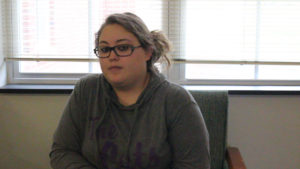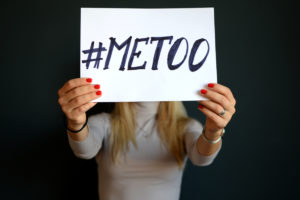
Christina Lynn Parker is a rape survivor and now works with other students to reconcile with their own experiences. You can find her and her fellow counselors in the UC on the 3rd floor. Photo by Morgan Miller.
Meet Christina Lynn Parker, a student at Western Carolina University and a rape survivor. This is her story of how she overcame the trauma of being violated and how she makes a difference by helping those who have experienced similar violence.
Parker was raped when she was 13 years old by a 16-year-old. It was a long and hard road for her, which she continues to struggle with, but thanks to the help from many strong women in her life she grew and learned how to use that experience to her advantage. She is now working and helping people who are survivors of rape and sexual assault on campus. Parker is one of the three sexual assault and domestic violence peer counselors or, as she defines them, awareness candidates. Through helping others, she has learned more about herself and how to cope with the violence of her childhood.
“I learned that you can overcome anything as long as you put your mind to it,” said Parker. “Suicidal thoughts, rape, sexual assault and domestic violence are all things you can overcome as long as you have the willpower to do it.”
Now finishing out her senior year at WCU, Parker only wishes that she had seen more of a positive change instead of continuously taking steps backward in bringing awareness to sexual assault and domestic violence. During the Sexual Assault Awareness Month in April, Student Government Association hosted a “car smash” event to help bring awareness to sexual assault. Parker is very adamant about how SGA should have handled this event in a more positive way and to properly bring awareness to the campus. As Parker explained in her interview below, she had to do “damage control” for weeks following the event due to the violence that was displayed. Read the opinion WCJ published here.
Regardless of these setbacks, Parker is still hopeful of the future and is starting to see more positive changes in the stigmatization of sexual violence towards both men and women on this campus.
“I am sad that this year I am seeing more males in my office, but I am also glad that they are starting to realize that there are resources out there for them as well,” said Parker.
She has noticed that the majority of men that have been coming to her to talk about sexual assault have been members of the LGBTQ+ community. Parker has also noticed that due to this massive stigmatization of men, typically they do not want to go to the authorities at first; they just want to talk it out with someone their own age and for somebody to just listen to them.

#MeToo Photo courtesy of Quillette
“Especially with the #Metoo movement, this has caused a huge uproar in women stepping forward saying that they have been sexually assaulted not only in Hollywood but also on campus as well,” said Parker. To read more about the #Metoo movement on WCU’s campus, click here.
While there have been both positives and negatives to come out of these events of the past few years on campus, Parker is passionate about the steps she encourages everyone to take when they come to her seeking both help and advice.
“I always give them [survivors] the same pieces of advice – go to the police, let’s go to the emergency room and see what we can get done, and then let’s talk about how we can get through this,” said Parker.
Even though she is just one of the few vital resources on WCU campus for students, she also recognizes that there is a lack of important resources on this campus that could be extremely helpful for survivors.
For one, she is disappointed in the lack of availability of these rape kits in this area, especially in the vicinity of a college campus.
“If there is one thing on this campus that I think they need to do above all else, they have got to start keeping rape kits in stock. Even if they are having to ship them out to Swain County to get them tested, having that resource on campus makes people more likely to go and get swabbed then if they had to drive all the way out to Swain County,” said Parker.
Regardless of this, she encourages everyone to speak up and talk to her or others about any sexual assaults or domestic violence they might have experienced.
“By not telling the authorities, you are allowing that person to do this to somebody else,” said Parker.
This student-run help center is located in the University Center on the third floor in room 337 with a constant open door policy. If you need to contact Parker or her colleague Kaylynn Wilson, please email them at either clparker2@catamount.wcu.edu or kmwilson12@catamount.wcu.edu. Or feel free to call or text Parker at (910)-985-0541.
“Victims are not just victims, they are survivors. Treat them as such” said Parker.
Listen to her full story in the video below.
Filmed and edited by Morgan Miller.


